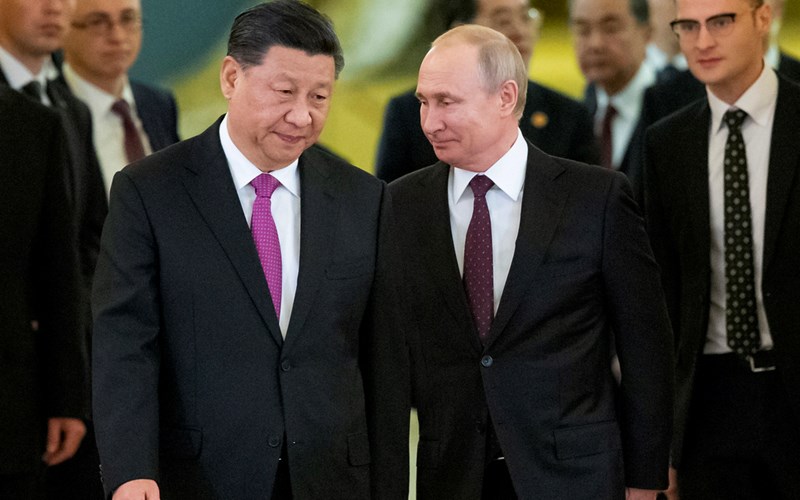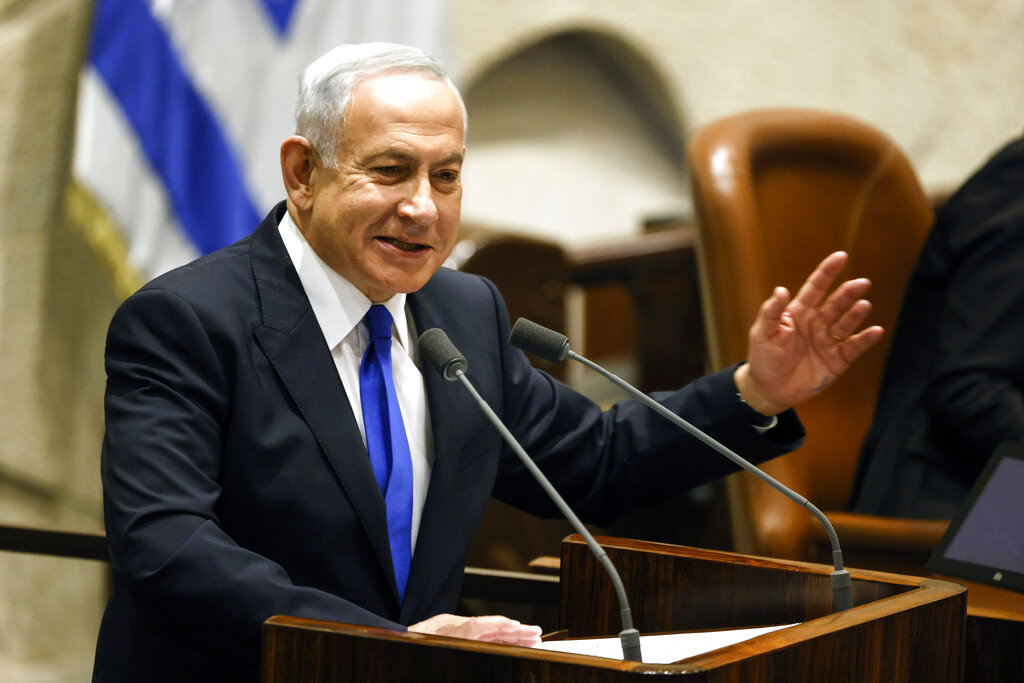In an expected update to a long-planned visit, Chinese leader Xi Jinping arrived in Moscow on Monday to meet with Russia president Vladimir Putin over several days, according to The Associated Press. “Xi’s government,” the AP wire service wrote, “gave no details of what the Chinese leader hoped to accomplish.”
 As if Xi and Putin would tell news reporters what they plan to discuss side by side, ear to ear, where the U.S. and NATO, and the CIA, MI6, and Mossad can't eavesdrop on that conversation.
As if Xi and Putin would tell news reporters what they plan to discuss side by side, ear to ear, where the U.S. and NATO, and the CIA, MI6, and Mossad can't eavesdrop on that conversation.
But there are some clues.
In an article published in the China-owned People’s Daily, timed to coincide with Xi’s visit, Putin calls the Russia-China relationship the “cornerstone of regional and global stability.”
It goes on to describe economic ties including record-setting bilateral trade; a Russian-Chinese pipeline in Siberia; and international agreements including the Eurasion Economic Union; the Shanghai Cooperation Organization; and the BRICS partnership that includes Brazil, Russia, India, China, and South Africa.
Elsewhere in the article, Putin accuses the U.S. and its allies of “sticking more stubbornly to its obsolete dogmata and vanishing dominance,” which he claimed means the West is gambling with the future of the entire world.
 “The U.S.’s policy of simultaneously deterring Russia and China, as well as all those who not bend to the American dictation,” the Russian president wrote, “is getting even more fierce and aggressive.”
“The U.S.’s policy of simultaneously deterring Russia and China, as well as all those who not bend to the American dictation,” the Russian president wrote, “is getting even more fierce and aggressive.”
Compare that accusation to a plea for the U.S. military to prepare for a fight. Last week, in a floor speech in the U.S. Senate, Republican Sen. Roger Wicker described a “very dangerous period” not seen since the Cold War because of “pariah states” that are craving power.
“It is no surprise the pariah states of Russia, Iran, and North Korea are growing closer to Beijing and to each other,” Wicker warned. “A free world is actually something that threatens them.”

Wicker, the ranking member on the U.S. Armed Services Committee, urged his colleagues to “stay focused on American might” or else allow U.S. adversaries to change the future.
Farther down in the speech, Wicker got more specific and pleaded with the White House and Congress to help Taiwan prepare for a future expected attack from China. The U.S. must speed up the process for selling Taiwan critical weapons and ammunition, he said, and the U.S. Army and U.S. Marines must work faster to re-establish their presence in the so-called “First Island Chain” in the Pacific.
Meanwhile, in the latest update to the Russia-Ukraine war, NATO leaders are discussing expanded presence across Europe that would assign 100,000 soldiers for combat if Russia crosses into NATO territory, according to a Politico story quoting a NATO official.
“I think you need forces to counter a realistic Russia,” the NATO official said.
 Europe’s countries have lazily spent little on national defense since the end of the Cold War but Russia’s invasion woke them up, and the Politico story described NATO leaders urging their political leaders to spend more money on weapons, ammunition, and equipment.
Europe’s countries have lazily spent little on national defense since the end of the Cold War but Russia’s invasion woke them up, and the Politico story described NATO leaders urging their political leaders to spend more money on weapons, ammunition, and equipment.
Back in China, AFN reported last week Xi has begun an unprecedented third term as Chinese Communist Party president after being “elected” by the National People’s Congress.
Much like Putin eliminating his foes with open windows and gravity, Xi approvingly watched last fall as political rival Hu Jintao got pulled from his seat and removed in front of 2,000 CCP delegates. Hu, China’s former president, looked confused about the interruption but appeared to know his fate as he was escorted out and other party officials looked away.
 Meanwhile, Russia’s president last week was declared a war criminal by the International Criminal Court for permitting Ukraine’s children to be kidnapped and sent to the Russian Federation. That arrest warrant is a “symbolic move” according to a Bloomberg article, and it comes after numerous Russian officials and oligarchs have mysteriously fallen out of windows to their deaths since Russia invaded Ukraine 14 months ago.
Meanwhile, Russia’s president last week was declared a war criminal by the International Criminal Court for permitting Ukraine’s children to be kidnapped and sent to the Russian Federation. That arrest warrant is a “symbolic move” according to a Bloomberg article, and it comes after numerous Russian officials and oligarchs have mysteriously fallen out of windows to their deaths since Russia invaded Ukraine 14 months ago.
In his People’s Daily article, Putin thanked China for its “well-balanced stance” on the war and said he hopes China will make a “meaningful contribution to the settlement of the crisis.”







